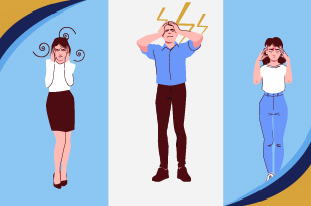Are you experiencing certain negative signs after a significant life event? If yes, then you might be suffering from trauma. Trauma is when a person experiences extremely stressful, frightening, or distressing events that appear to be hard to handle. It can occur as a single incident or continued event over a longer time. Almost 70% of people worldwide suffer from trauma in their life. Most people experience an event once in their lives that turns out to be a trauma. However, not everyone is affected in the same way. Trauma can be experienced at any age and by anyone.
This article is a perfect guide to understanding what trauma is, the different forms of trauma, the possible reasons, the impact of trauma on mental health, and what can be the best treatments to treat trauma.
What is Trauma?
Trauma is the emotional response to a terrible event like an accident, crime, natural disaster, physical or emotional abuse. Shock and denial are the most common feelings experienced after a particular trauma. Additionally, feelings can cause disturbances in the daily life routine of the sufferers.
What Are The Common Types Of Trauma?
Major life events like divorce or bereavement can cause trauma. We all distinctively have experienced trauma once in life. There are a few basic categories of trauma often experienced.
Childhood Trauma:
Childhood trauma develops if you have experienced trauma for a more extended period.
Many people face trauma in their childhood. These adverse experiences can take the shape of severe mental health problems as an adult. This is common if you never had the required mental support to manage the trauma signs.
Collective Trauma:
Collective trauma happens when a large number of people witness a traumatic event. Additionally, it is important to understand that not every person experiences trauma the same way. But everyone has a unique way of coping with it.
Generational Trauma:
Generational or intergenerational trauma is a category of trauma that runs in the family and is experienced across generations of family, culture, or group. It is crucial because trauma that occurred in the past has a negative impact on the current generations.
Moral Injury:
Moral injury refers to the feeling one experiences in a situation that goes against one’s morals, values, or beliefs. It is usually experienced in such situations where you must make big decisions about other people’s lives.
Racial Trauma:
Racism can also lead to trauma that can severely impact your mind and body. A person undergoing racial trauma experiences feelings of depression and finds it hard to relax.
Secondary Trauma:
This type of trauma happens when you or someone else go through trauma or are closely connected to a traumatic event. However, you have not experienced the trauma directly. It is also known as vicarious trauma.
Learn More: Understanding The Connection Between Male Depression And Emotional Affairs
What Are The Symptoms Of Trauma?
Signs of trauma can be experienced in both ways, emotional and physical. The emotional response can develop intense feelings that affect a person’s attitude, behavior, overall functioning, and how they view the world. Many people experience Post-traumatic Stress Disorder or an Adjustment Disorder after experiencing a traumatic event.

Psychological signs of Emotional Trauma:
- Extreme fear
- Helplessness
- Lack of attention
- Sudden changes in behavior
- Feelings of Denial
- Anger outbursts
- Depression
- Anxiety
- Feelings of guilt and shame
- Self-blame
- Social withdrawal
Physical signs of Emotional Trauma:
- Escalated heart rate
- Body pains
- Muscle tension
- Easily startling
- Nightmares
- Insomnia
- Tiredness
- Sexual dysfunctioning
- Changes in eating patterns
What Are The Causes Of Trauma?
Trauma can arise due to several factors at different stages in one’s life. Some of the common causes of trauma include:
Experiencing violence:
Experiencing any form of violence, witnessing it, or having any involvement in it is a common reason for many people to develop trauma. It may develop from domestic abuse, sexual assault, child abuse, war combat, or any violent incident.
Being involved in or witnessing a serious accident:
An unpleasant accident can lead to trauma development, whether you are directly involved or have just seen the incident.
Abuse:
Any sort of abuse can be the leading reason for developing trauma, such as physical, emotional, and sexual abuse.
Assault:
Rape or a violence assault can be the reason for a traumatic reaction; you can be the victim of the attack or know someone who was the victim.
Who Is Vulnerable To Trauma?
Anyone can experience trauma in their lives. It is crucial to understand that trauma can develop in anyone regardless of age, gender, and social status.
In addition, marginalized communities often experience generational trauma that is sustained by discriminatory systems, such as racial discrimination. The victims can also experience additional challenges in getting trauma treatment due to the culture and strict stigma towards mental problems in the given communities.
Learn More: Child Psychiatrist – A Guide For Parents & Guardians
The Effects and Duration of Different Types of Trauma
Acute Trauma
Acute trauma can differ from one individual to another. Some may have lasting effects of trauma for months, others for years.
Acute stress disorder is experienced when one has been through or has witnessed an event that is considered to be traumatic. Vicarious trauma is also another effect of experiencing a traumatic event, and this can change one’s life. Additionally, signs of acute trauma last for a month.
Complex Trauma
The usual duration of complex trauma can last for years and be influenced by the type and extent of the traumatic experience and the person’s psychological and social environment, treatment options, and ability to mobilize support. Complex trauma usually implies an accumulation of multiple, chronic, and prolonged traumatic experiences, usually of an interpersonal origin (for example, abuse, neglect, or experiences of domestic violence).
Chronic Trauma
The duration of chronic trauma is based on the amount of time a person has been exposed repeatedly to a particular trauma. Additionally, chronic trauma is based on the understanding that it is not a singular event but rather a continuous experience of stressors in one’s life that can cause long-lasting psychological and physical consequences.
What Are The Common Treatments Available For Trauma?
Identifying the correct treatment plan for treating the trauma type is crucial. The following are the most common and effective treatments for trauma:
Imaginal exposure:
This is an exposure technique in which the patient is asked to imagine the trauma and describe it loudly to the mental health therapist. It is best if the patient has been avoiding thoughts and memories associated with the actual trauma-triggering event. This technique helps in defying it.
In vivo exposure:
This is also a sort of exposure therapy technique. It is done beyond the session in the course of day-to-day activities. Many people with trauma avoid situations that bring back memories of the trauma; it is meant to guide you to engage with such scenarios gradually.
A written account:
It could be in the form of a diary entry where your therapist may request you to write a description of the trauma that you went through.
Impact statement:
One of the cognitive processing therapies used is completing an impact statement, in which the patient explains why, in their opinion, the traumatic event occurred and its consequences.
Cognitive restructuring strategies:
Cognitive processing therapy can also include cognitive restructuring skills, which enable you to replace maladaptive thinking with adaptive thinking.
Summary!
Trauma is defined as a person’s response to events that are distressing and hard to handle, either as a single event or a repeated event. Different categories of trauma include childhood trauma, collective trauma, generational trauma, moral injury, racial trauma, and secondary trauma. They also include psychological signs, including very high levels of fear and depression. Physical signs include a high rate of heartbeat and inability to sleep. The leading causes of trauma include violence, accidents, abuse, and assault. The most effective ways to treat trauma based on the severity and type include imaginal and in vivo exposure, written accounts, impact statements, and lastly cognitive restructuring techniques. So, if you are experiencing any kind of trauma and seeking a reliable mental health professional, then you are on the right page. Hurry up and get in touch with our outstanding team of mental health professionals at Orange Coast Psychiatry today to gain the benefits of effective treatment methods for trauma.
























